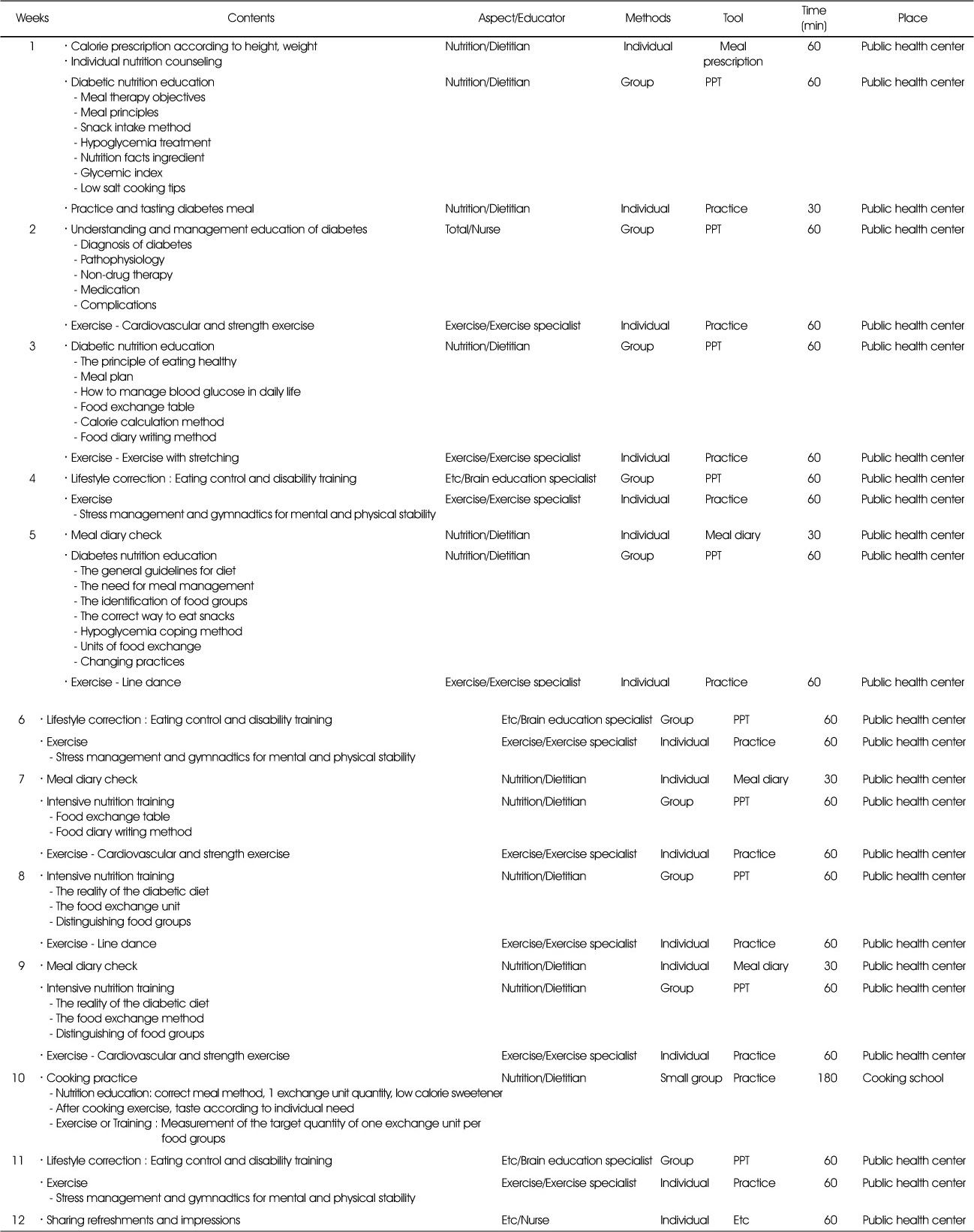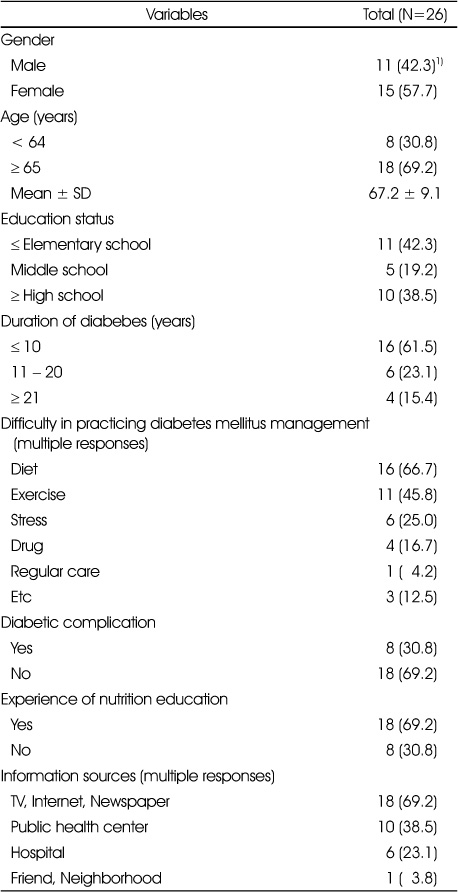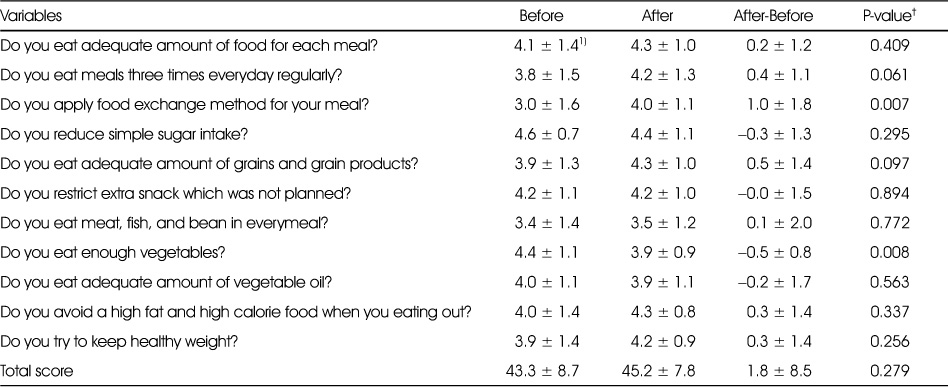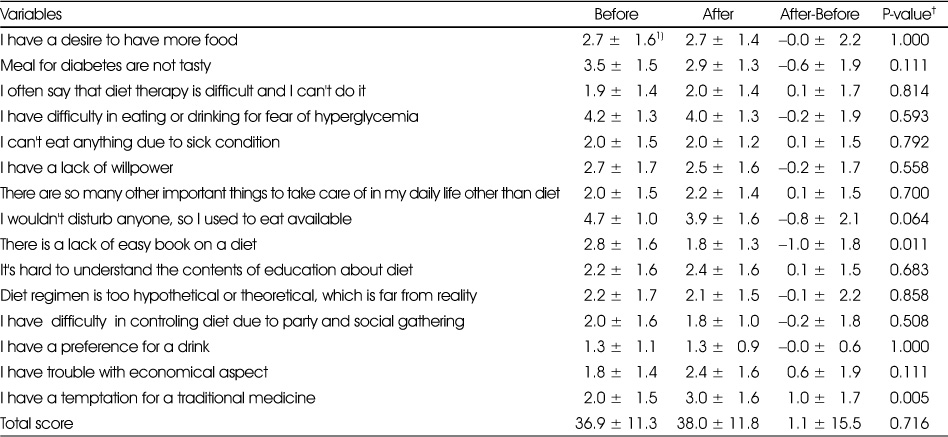Articles
- Page Path
- HOME > Korean J Community Nutr > Volume 23(2); 2018 > Article
-
Research Article
- Effects of an Intensive Management Program for Diabetic Patients on a Blood Biochemical Profile and Diabetes Knowledge
-
Su-Jeong Yeo, Bok-Hee Kim

-
Korean Journal of Community Nutrition 2018;23(2):148-161.
DOI: https://doi.org/10.5720/kjcn.2018.23.2.148
Published online: April 30, 2018
1Department of Nutrition Services, Chosun University Hospital, Gwangju, Korea.
2Department of Food & Nutrition, Chosun University, Gwangju, Korea.
- Corresponding author: Bok-Hee Kim. Department of Food and Nutrition, Chosun University, 309 Pilmun-daero, Dong-gu, Gwangju 61452, Korea. Tel: (062) 230-7721, Fax: (062) 225-7726, kimbh@chosun.ac.kr
Copyright © 2018 The Korean Society of Community Nutrition
This is an Open-Access article distributed under the terms of the Creative Commons Attribution Non-Commercial License (http://creativecommons.org/licenses/by-nc/3.0/) which permits unrestricted non-commercial use, distribution, and reproduction in any medium, provided the original work is properly cited.
- 1,257 Views
- 1 Download
- 4 Crossref
Figure & Data
REFERENCES
Citations

- Impact of a public health center nutrition education program on patients with type 2 diabetes in a primary care-based chronic disease management project: a pilot intervention study
Haerim Yang, Yoo Kyoung Park, Ji-hyun Lee, Hee-Sook Lim, Heejoon Baek, Hyejin Lee, Haeran Park, Pyunghwa Lee, Jooyoun Chung, Won Gyoung Kim
Korean Journal of Community Nutrition.2024; 29(6): 492. CrossRef - The Associated Factors of Medical Treatment in Diabetic Patients
Sun Ju Choi, So Yeon Ryu, Jong Park, Seong Woo Choi
Journal of Health Informatics and Statistics.2021; 46(3): 302. CrossRef - Association between diabetes mellitus and anemia among Korean adults according to sex: a cross-sectional analysis of data from the Korea National Health and Nutrition Examination Survey (2010–2016)
Mihye Kim, Sook-Hyun Lee, Kyoung Sun Park, Eun-Jung Kim, Sujung Yeo, In-Hyuk Ha
BMC Endocrine Disorders.2021;[Epub] CrossRef - Effect of Nutrition Counseling by Nutrition Care Process on Diet Therapy Practice and Glycemic Control in Type 2 Diabetic Patients
Tae-Jeong Bae, Na-Eun Jeon, Soo-Kyong Choi, Jung-Sook Seo
Korean Journal of Community Nutrition.2020; 25(3): 214. CrossRef
Contents of intensive management program
General characteristics of subjects
1) N (%)
Changes in anthropometric characteristics by intensive management program
†: Tested by paired t-test
1) Mean ± SD
Changes in blood pressure and biochemical characteristics by intensive management program
†: Tested by paired t-test
1) Mean ± SD
2) Sample size: 18
Effect of intensive management program on daily activity
†: Tested by paired t-test
1) Mean ± SD
2) Total(Maximum) score was 8 score
Effect of intensive management program on knowledge of diabetes and diet therapy
†: Tested by paired t-test
1) Mean ± SD
Effect of intensive management program on meal behavior
†: Tested by paired t-test
1) Mean ± SD
Effect of intensive management program on barriers of meals
†: Tested by paired t-test
1) Mean ± SD
1) N (%)
†: Tested by paired t-test 1) Mean ± SD
†: Tested by paired t-test 1) Mean ± SD 2) Sample size: 18
†: Tested by paired t-test 1) Mean ± SD 2) Total(Maximum) score was 8 score
†: Tested by paired t-test 1) Mean ± SD
†: Tested by paired t-test 1) Mean ± SD
†: Tested by paired t-test 1) Mean ± SD

 KSCN
KSCN








 Cite
Cite


